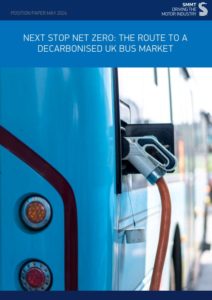Buses could be first to fully decarbonise – SMMT report
But support will be necessary
Britain’s buses could be the first to be totally net-zero if a timetable of support for this is introduced, according to a report by the Society of Motor Manufacturers and Traders (SMMT).
Society of Motor Manufacturers and Traders (SMMT).
SMMT highlights that bus manufacturers have invested significantly in green innovation with some 13 different zero-emission models now available in the UK. More than four in ten new single- and double-deckers joining British roads last year were either electric or hydrogen and the market could be fully decarbonised as early as 2030 if all the right enablers are put in place, according to the organisation. At present, however, it believes the benefits are unevenly distributed.
Of all new ZEV buses registered last year, Greater London accounted for 46.8%, despite the city accounting for fewer than one in six new bus registrations overall. While government support has enabled some specific cities to invest, uptake outside of the capital is far lower. The rest of England outside of London took 30.3% of new ZEV buses, while Northern Ireland received 3.3%, just slightly more than Wales, which accounted for just 2.2%.
Scotland, meanwhile, accounted for 17.5% of all new ZEVs reaching the UK’s road last year. This is in part due to operators benefiting from Scottish Zero Emission Bus funding, which is helping smaller bus and coach operators of scheduled services, such as rural community and home-to-school services, to decarbonise. Equally, the national Zero Emission Bus Regional Area (ZEBRA) fund has been instrumental in spurring greater green uptake across the UK, says SMMT. However, the scheme’s lengthy grant application process and short-term application windows mean only the biggest operators with the most resources are successful, it says.
Smaller and rural operators also face a tough challenge due to often longer routes and lower ridership, despite the opportunity of mass green mobility helping to boost passenger numbers in semi-urban and rural areas by as much as 65%.
SMMT’s new position paper, Next Stop, Net Zero: The Route To A Decarbonised UK Bus Market, sets out the case for a clear timetable to put every region, operator, driver and passenger on the journey to net zero. The SMMT says that timetable, however, must be backed by long-term, accessible support for fleets of all sizes in the form of incentives given the particularly tight margins faced by bus operators since passenger levels fell sharply in 2020. The challenge of switching is made steeper – and the need for incentives even more critical – by the higher upfront cost of these new zero-emission vehicles compared to their fossil-fuel powered predecessors.
Decarbonising buses also depends on infrastructure in depots, and establishing the best locations for shared charging and refuelling hubs, which will take time – so action must be taken today, says the SMMT. While Britain is Europe’s biggest ZEV market, it needs a strategy to deliver the necessary infrastructure and incentives to help operators overcome the challenges to delivering a full ZEV market.
“Britain’s bus industry is in a strong position to become the first vehicle sector to decarbonise” – Mike Hawes, SMMT Chief Executive
Mike Hawes, SMMT Chief Executive, said: “With the biggest zero-emission market in Europe, Britain’s bus industry is in a strong position to become the first vehicle sector to decarbonise. Reaching that destination, however, requires a clear timetable and appropriately ambitious support. Governments have played a vital role in driving uptake through grant funding, and every region should be supported so that all passengers can enjoy the advantages of going green. Only then will the full benefits of sustainable public transport be realised nationwide, a necessary part of our task to deliver net zero road transport.”
“For many operators the total cost of ownership of a battery electric bus is now at parity or even slightly lower than diesel equivalents” – Ben Foulser, UK Head of Future Mobility for KPMG
Ben Foulser, UK Head of Future Mobility for KPMG, said: “For many operators the total cost of ownership of a battery electric bus is now at parity or even slightly lower than diesel equivalents. However, there remains significant challenges in providing the up-front capital required for both the vehicles and the charging infrastructure – especially where costly grid connections are needed.
“KPMG’s work for Transport Scotland’s Bus Decarbonisation Taskforce sets out different ownership and financing models that can be adopted for vehicles, batteries, and energy infrastructure to address these challenges. These include the opportunity for municipal ownership of zero emission buses (e.g. in franchising schemes), and how energy providers can contribute to up front capital spend.”